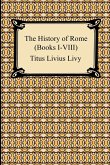Written in the 2nd century by the Greek historian Polybius, "The Histories" is a multi-volume work detailing many of the events, people, and ideas of the Hellenistic Period. While his focus is the space of time in which ancient Rome became a world power from 220 to 167 BC, Polybius also discusses his role as a 'pragmatic historian', a discourse on fate (called tyche), and the superiority of the mixed constitution. Though all forty volumes have not survived to the present day, the complete books extant today cover the affairs of all the important nations of the time, including Egypt, Greece, and Spain, as well as the first and second Punic Wars. Polybius speaks at length on the government of the Romans, citing it as the reason for Rome's success as a force of the world. Though it includes a couple of digressions concerning lesser issues of the time, "The Histories" has proven and continues to be a valuable text when studying the Hellenistic time period and manner of writing. Presented here in this volume are the complete extant histories of Polybius in a translation by W. R. Paton printed on premium acid-free paper.
Hinweis: Dieser Artikel kann nur an eine deutsche Lieferadresse ausgeliefert werden.
Hinweis: Dieser Artikel kann nur an eine deutsche Lieferadresse ausgeliefert werden.
...this new translation of Polybius will be a valuable resource for teachers and students of Polybius and Roman history. The authors deserve no small praise for permitting one of the most highly regarded ancient historians, yet also one of the least read, speak to a new generation. Bryn Mawr Classical Review








